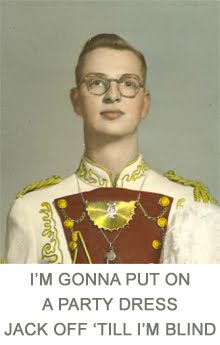Quite some time ago,
Twisty Faster1 posited that no truly authentic women's culture could exist so long as women are judged primarily by sexist/patriarchal standards (i.e., "show us your tits"). She was blogging in response to the question of whether or not there is
any rock music appropriate for a feminist. Her answer?
No. Yes. No. [...] My premise is that pop music does not exist in a vacuum, so, like painting or literature or history, it necessarily absorbs the hegemony of the larger culture, which happens to be a woman-hating culture.
I've been thinking about this on and off for quite some time, and I still can't say whether I completely agree with her or not. I think the above is largely true. That doesn't mean that women in rock are necessarily supporting or acquiescing to misogyny, but that—at the very least—they're still stuck
reacting to it. In other words, there's no space to find out what music would be if it didn't have to constantly address these issues (whether you're battling it head on like Bikini Kill, or turning to some sort of essentialist Earth Mother counter-culture like Lilith Fair).
Speaking of Bikini Kill,
The riot grrls took a valiant stab at it--because goddammit chicks can too rock, assholes!--but the thing is, they were merely infiltrating an existing paradigm; the models of rockstardom and sexgod cockworship were slightly retooled to accommodate women performers, but this was not, to my mind, so much an "authentic" women's art form as it was girls rockin’ out according to a male code (this is a common rockdude criticism of the riot grrl school, but I don't mean it dismissively; there was no other conceivable outcome, and besides, that shit was a blast.)
I guess my minor disagreement is over whether rock is
inherently, paradigmatically male. Does male hegemony of rock culture preclude the possibility that women could make music in the same vein without it being inauthentic? The culture may be male oriented, but does rock
qua rock
2 have to be?
I'm reminded of another gender-bending act,
Lez Zeppelin. Asked why an all-female Led Zeppelin cover band worked so well, they speculated it was because Zeppelin itself was already a pretty girly band. Part of their appeal was that all those fourteen year old boys secretly wanted to make it with Robert Plant (admit it). Seeing women do those songs made it OK to at least subconsciously acknowledge those fantasies.
Rock has a long history of being a space where hidden (or not so hidden) sexualities could find expression and even flourish. From Bessie Smith and Ma Rainey, to Little Richard, David Bowie, disco, and Deerhunter, gay culture has arguably had more of an influence on the history of modern music than anything else. (Not that the struggle for gay rights and women's rights are exactly the same thing, but they are, of course, linked). All of which is to say that I think it's possible that rock was co-opted as much from women and gay culture as it was from black musicians. White dudes may run the show, but it doesn't make the music theirs.
Anyway, all of that's a long way to go to mention that
Kill Rock Stars will apparently be reissuing The Raincoats long out of print first album. The Raincoats were, as far as I'm concerned, simultaneously
the feminist band, and the most authentically
female band, ever (laying aside the fact that there are as many different types of "authentic women's music" as there are women in music).
The Raincoats were deeply feminist, but at the same time so unique that, even while singing about explicitly feminist concerns, the issue of their own gender seems...less important?
3 Which isn't to say that it's absent or even neutral (which generally gets interpreted as "male", the same way neutral was code for "white male" during the Sotomayor nomination process), just that it's been transcended, or at least subverted and twisted to such a degree that it becomes nearly impossible to tease out. Check out their gender-bending cover of the Kinks' classic
Lola, for example. A group of women covering a love song originally written by a bunch of guys—but a song that was already celebrating a man's relationship with a trans woman who introduces him to the world of love and sex. By covering the song without changing any of the lyrics or pronouns, the Raincoats erase the possibility of assigning a gender to the narrator. Could it even matter at this point?
Making the most of the DIY landscape opened up by the punk scene, The Raincoats went ahead and crafted a completely new language: a minimalist-folk-punk-dissonant-avant-garde-marxist-feminist-pop that's never unapproachable or bogged down by the abundant experimentation. Even today, it's shockingly, refreshingly new in the way punk was always supposed to be.
1. This post was from
I Blame the Patriarchy waaay back in 2005, so don't go bothering her there. Twisty now blogs as Jill, and you can enjoy her advanced patriarchy blaming
here.
2. I know. I am a pretentious asshole.
3. When I say that gender issues seem less important with the Raincoats, I mean that, more than any other band, they don't sound like they're reacting to anything or anyone else. Kurt Cobain wrote that he always felt like he was listening in
on them rather than
to them. Their music was something private, created just for themselves, even if they later released it to the world.
Part of that personality comes from the way they played, as if they were each moving towards the
idea of a song, but in their own way at their own tempo. It's some type of egalitarian magic where no member dominates, but together they shift in and out of focus and synchronicity; an organized disunity that gives them a startling emotional depth.
























